#characterizations
Text
You know what’s great about Dr. Facilier?
He’s the perfect villain opposite both Tiana and Naveen.
He’s not exactly like Jafar or Ursula, who know they’re evil and delight in it as like, a lifestyle. He’s more like Scar. He’s introduced getting money on the street through cons and feeling satisfied…until Big Daddy LeBouf drives by with all his money and makes him feel insignificant.
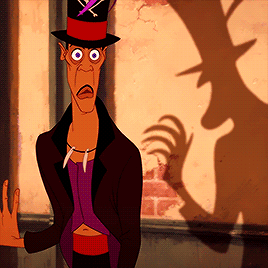
You get the idea that something in life made him this way—there was a beginning to his villainy. You don’t get that sense from like, Clayton or Gaston.
So he’s a relatable character with flaws, to an extent.
But those flaws specifically play off of Tiana and Naveen’s characterizations.
Tiana has no real respect from her peers—she is in a position to be jealous of Lottie the same way Facilier is jealous of the Cotton King. But where Tiana simply works hard and refuses to let others make her bitter, Facilier has clearly taken shortcuts. Or…”the easy way.”

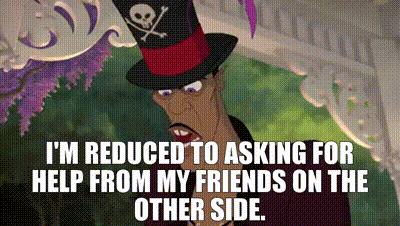
Then there’s Naveen.
Naveen has no thought beyond the present; he thinks they’re “on this earth to have some fun,” and frequently jumps without looking at the consequences. Leaps without looking! Doesn’t stop to find out if the girl he’s kissing is a real princess even though he knew his original invitation was to a costume party, forgets that he’s supposed to be getting married and plans on continuing his playboy lifestyle, wanders into a shadow-man’s shop. But eventually he learns to open his eyes to what’s important, and what will last, in Tiana. And he takes that seriously; if he marries her instead of Charlotte, he has to get three jobs.
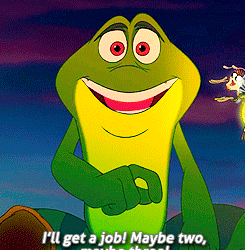
Facilier, on the other hand? He not only does the opposite of Tiana and has taken shortcuts to get where he is—but he also suffers from Naveen’s flaw; he keeps making what are basically get-rich-quick schemes with his “friends on the other side.” When we meet him, he’s stressed and certainly on edge about failing—but that doesn’t stop him from asking for more and more debt from the demons, and he basically goes to his grave still making promises he can’t keep…like Naveen’s promise he couldn’t keep to pay Tiana for kissing him.
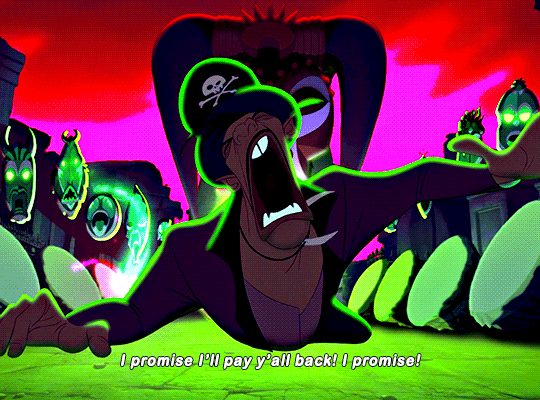
He’s got Tiana’s focus and Naveen’s charisma. He’s got Tiana’s lofty goals and Naveen’s dependence on others to do his dirty work.
He’s exactly like Tiana and Naveen put together, aged about twenty years, but with none of their good qualities. Perfect villain for those two main characters.
But he’s also the opposite of Mama Odie.
He entices innocents with what they want while she lights their way by explaining what they need.
He wants total control, while she’s satisfied with simply giving advice and sending people on their way.
He directly transforms his victims, while Mama Odie shows Tiana and Naveen how to work toward their transformation on their own. I mean, you guys noticed that she could have done it for them, right?

But she doesn’t, because she’s the symbol of that Disney Faith-Based morals: you act on what you know is true instead of taking the easy way to what you want. Facilier does the opposite: he promises to give you the easy way to what you want, and tries to tell you why you should accept his deals—but his reasons are all lies.
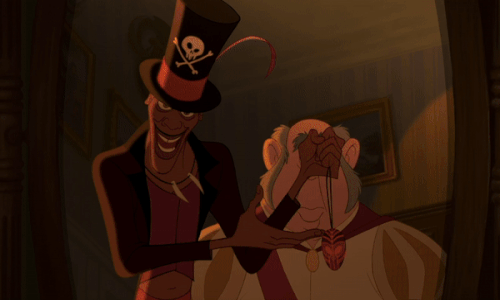
That’s how you write a villain, ladies and gentlemen.
#Disney#dr. Facilier#Facilier#princess and the frog#the princess and the frog#Naveen#tiana#characterizations#writing#meta#Disney princesses#princess tiana#Disney villains#writing for villains#storytelling#character analysis
577 notes
·
View notes
Text
"Les Misérables" musical character interpretations: Fantine
As usual, these three characterizations are all based on performances I've seen, either in person or filmed. They can also be, and often are, combined with each other to create still more characterizations. For example, Anne Hathaway's Oscar-winning Fantine in the film version is basically "the Ingénue," but with a distinct undertone of "the Fighter." And none of them are precisely Hugo's Fantine. I'd say that they all represent aspects of the character as Hugo wrote her, and that the ideal Fantine would blend all three of them, as the occasional actress does.
I'd like to thank @quarryquest for sending me the Fantine chapter of her book on the stage history of Les Mis just as I was in the middle of writing this. It provided excellent insights.
The Lady

This Fantine, in the words of Victor Hugo, displays “a serious and almost austere dignity.” At the beginning, her dress and hair are as neat, clean, and pretty as factory work allows, and her bearing is strikingly graceful and refined. She clearly once knew a better, more elegant life before her lover abandoned her. This sets her apart from the rough, uneducated factory folk who surround her, and at first, she might seem slightly cold and haughty in her distance from them, which no doubt contributes to how quickly they turn on her. But “I Dreamed a Dream” earns all our sympathy as she sings of her lost happiness, while in “Lovely Ladies” she moves us further by slowly sacrificing all her elegance for her daughter. Yet she never loses her core of pride and dignity. While this Fantine has as much raw anguish as any other, she tries to hide it from her oppressors under a brave face. Though she might reach the verge of tears several times, she’ll rarely let herself cry. When the moment of selling her body arrives, she’ll swallow her grief and fear with the drink she’s given, and offer a firm, resolute hand to her first customer. Her “Come on, captain…” is sultry, but not drunk or grotesque; instead, her hard, cold tone evokes Hugo’s description of the fallen Fantine as having “turned to marble.” Her rejection of Bamatabois will be calm and businesslike until he turns violent, and when “Monsieur Madeleine” approaches her, she’ll express her anger with head held high, making it clear that she sees him as no better than herself. This Fantine is a gemstone that’s thrown into the mud of the streets, but never breaks.
The Ingénue

This is a warmer, softer Fantine than the Lady, and whether the actress is twenty-five or forty, she’ll probably seem younger too. This characterization keeps in mind that Fantine’s name means “childlike” and that her “tragic flaw” in her past was her naïveté. Despite being an abandoned mother, she hasn’t entirely lost that naïveté at first. Her air of gentle innocence is what sets her apart from the other, more worldly factory folk, and throughout the factory scene she’ll be frightened and brutally shocked by the cruelty she faces. Then “I Dreamed a Dream” will overflow with anguish, and likely with tears too. With just cause, this Fantine is more prone to tears than any other. More than the loss of her dignity, the tragedy of “Lovely Ladies” is the loss of her innocence, which dies once and for all when she accepts her first prostitution client, crying or trembling with fear as she does so. What comes next will depend on whether the director thinks the “Old men, young men…” verse contains a time skip or not. If not, then this Fantine will be awkward and nervous on “Come on, captain…” still all too new to her profession. But if so, then she’ll reenter heartbreakingly transformed: staggering drunk, crudely flaunting her body, utterly disheveled and broken. Either way, she rejects Bamatabois out of rash fear, then claws at his face in rash, animalistic rage. Abuse and misery reduce this vulnerable young woman to behaving like a cornered stray dog or cat. Yet through it all, there’s never a doubt that her heart remains pure and tender, because everything she endures is for the sake of her little girl.
The Fighter

This is the grittiest Fantine. Her portrayal reminds us that Hugo’s Fantine was an orphan who grew up on the streets and that he describes her as having “fierce courage.” This is a passionate, determined woman who boldly stands up to her oppressors and who battles all obstacles to provide for her daughter. Like the Lady, she values and defends her dignity, but hers is a stolid, down-to-earth working-class dignity, not aristocratic grace. In “At the End of the Day,” she’ll protect her letter from the Factory Girl with the fierceness of a mother bear, and her self-defense to the Foreman will be firm and simmering with frustration. Her “I Dreamed a Dream” will also be angry as well as anguished and yearning, and in “Lovely Ladies,” the chief tragedy will be that despite her valiant efforts to stay “above the water,” poverty pulls her under anyway. Her prostitution sequence may or may not be drunken, but it will most definitely be hard, brash, and filled with biting rage. In her bitterness, this fallen Fantine will recall Jean Valjean as a convict before the Bishop’s mercy, and when she confronts him about her firing, she’ll stop just short of attacking him. None of this means she lacks vulnerability or deep, heartbreaking sadness; like any Fantine, she has them in spades. But the way she combines them with strength and anger make her a more complex figure than other Fantines, and arguably, it makes the gentleness of her deathbed scene especially poignant. There, for the first time, we fully see the motherly tenderness that lies beneath her fire, and which has motivated her struggles all along.
More comparisons to come!
#les mis#les miserables#fantine#musical#characterizations#comparison#tw: violence#tw: prostitution#tw: death
90 notes
·
View notes
Text
it pisses me off when people say that characterizations are 'wrong' in the marauders fandom, but i do feel like sometimes ppl mix up the personalities of james and lily.
a lot of people see james as the sun (and i agree) but they see him as this all-loving, understanding boy who will save/embrace anyone he comes into contact with. like, that's completely against his (canon) character?? what i see in james is a guy who has a strong moral compass, a strong understanding of right and wrong and knows how to act on it. james is the one who constantly fights w bigots during hogwarts (not to say that lily doesnt)
lily i feel is the one who is actually more benevolent and understanding. she sees the world in shades of grey, and james sees more black and white. sure, she grows over time, but lets not forget that she's the one who stays friends w someone even after he proves himself to be bad. if we're going by fanon, lots of ppl hc that she stayed friends w him even after mulcibers attack on mary??? like?? lots of people see her as this woman who will fight anyone who is in the wrong, and while on the most part i agree, that's not really how it goes in canon.
#james potter#lily evans#marauders#characterizations#hp#maybe its just me???#just bc james saved snapes life it doesnt mean he'd readily embrace him???#lily on the other hand tho...#love her but girl sees the good in everyone#jegulus#jily#maybe we just all hate canon?#marylily
142 notes
·
View notes
Text
Have read a lot of fic where Shen Jiu is a hurting, depressed guy who's internal voice goes 'so what if I hurt I'm just a pathetic dirty little rat clinging to everyone and ruining them' - but also thinking that I like it when Shen Jiu just flat out doesn't care.
Like, 'okay I'm a rat and you think I'm hurting everyone around me and indeed I actually am but so what? I don't define myself by your opinion, if they let themselves get hurt how am I to blame?'
What he does has nothing to do with others, and others have nothing to do with him (inconsiderate). One of those assholes that would probably run you over and shrug because, like, mhmm you could have just dodged. I would've if I was in your place.
Nevermind if you're in a wheelchair.
If you confess your love to him, he'd go 'okay'.
Torn between the two because there's more hurt in caring about the fact that no one cares about you and that's angst, but also on the other hand I just want to let him be a callous bastard that's really just single-minded about keeping his promise to Qi-ge just because he made that promise and he'll keep it but also doing it thoroughly and wholeheartedly because he could and would keep that promise out of spite bcs unlike others he actually could keep a single promise. Like, it's not that hard, you know.
(He's in denial that he has something as disgusting as feelings but that's not important, actions are worth more than words and actions and words translate to him being an asshole.)
"Uh-huh, I'm a horrible person, and then?" is the summary of his character.
#Shen Jiu#Me flipping between two interpretations depending on the mopd.#And I write#Shen Qingqiu#character analysis#Characterizations
20 notes
·
View notes
Note
1.Hello Steph, I saw the discussion on how adorable Sherlock and John were in S1. Sherlock's characterization in the UAP/ASiP is pretty close to ACD Holmes. Holmes selected a couple of classes at Bart's, not for a diploma but for learning more science for better crime solving. When Watson walked into the lab with Stamford who used to be a lab tech under Watson, Holmes just discovered a hemoglobin-specific reagent to detect old blood stains or extremely diluted blood.
2. He was enthusiastic and friendly, and showed off his research to Watson: "He seized me by the coat-sleeve in his eagerness, and drew me over to the table at which he had been working" :) Re: the flatshare, "Sherlock Holmes seemed delighted at the idea of sharing his rooms with me." When it came to each other's shortcomings, Watson said, "and I object to rows because my nerves are shaken,...” “Do you include violin-playing in your category of rows?” he asked, anxiously. (anxiously!!!)
3. “It depends on the player,” I answered. “A well-played violin is a treat for the gods—a badly-played one——”. “Oh, that’s all right,” he cried, with a merry laugh. “I think we may consider the thing as settled—that is, if the rooms are agreeable to you.” ACD Holmes was more eager than BBC Sherlock to snatch Watson as his flatmate :D! He just couldn't wait to settle it, LOL!
4. Not to mention Holmes blushed at Watson's compliments. “You have brought detection as near an exact science as it ever will be brought in this world.” My companion flushed up with pleasure at my words, and the earnest way in which I uttered them. I had already observed that he was as sensitive to flattery on the score of his art as any girl could be of her beauty. They downplayed this scene in BBC Sherlock.
5. Too bad the writers didn't keep the characterization in UAP/ASiP throughout the series. It's already subdued compared to ACD Holmes and later they just decided it's not cool or bizarre enough and totally destroyed it. My poor fathers. Oh, they also destroyed Irene "just hasn't met the right guy" Adler. Have a great week, Steph! Nice chatting with you (hearts).
(referencing this post, I believe)
Hey Nonny!
Ahhh thank you so much for sharing! And to be fair the UAP WAS kinda rushed and paced weird, so a lot of the writing felt all over the place. But I LOVE the comparison to ACD Canon!!!! Thank you so much for finding the similarities, and I agree, I think if they kept the S1 and S2 characterization throughout the rest of the series (despite how much I love S3 and TAB), I too would have enjoyed the show a lot as well.
I respect why people don't care for S3 and TAB. I thought they were a good "step up" in their character arcs, but S4 is just something else, LOL.
Thank you so much for sharing, and for the well wishes <3
27 notes
·
View notes
Text


have i told u guys my classic cartoon hyperfixation has returned
#this is specifically like their#tlts#characterizations#its short for#the looney tunes show#bugs bunny#daffy duck#lola bunny#all caps#tf2#tf2 spy#tf2 scout#cuz yknow. theyre there#my art
32 notes
·
View notes
Text
today I’m choosing violence (cause i'm tired of poor characterization of characters and the idolization of characters that are plain)
I’m gonna say if “being kind” or "they're so cool" are the only character traits you find interesting or that you love-
It may be time to accept that you enjoy a boring character (which is fine)
If being able to fight, or save people or have the strength/courage to go on, is the only trait they have that’s “interesting.”
Ask yourself why.
Arguably MOST characters are kind, are able to fight (to some capacity), want to save people and and are literally written in stories to have the capacity to “go on,” (unless they are killed)
Why are these the character traits you decided to go with? Are they admirable? Sure… but also name another few characters in the same piece of media that would do the exact same things?
Oh there are SEVERAL characters that have those same character traits?
Okay- So what makes your character interesting then?
I’ll wait.
So I see, you’re struggling to find anything else?
Yeah
There’s nothing inherently wrong with liking boring characters.
But acknowledging that your “fave” character has a shell like personality is good critical thinking. And sure maybe you don’t want to dissect media in this way. You want to be able to mindlessly enjoy content. That’s fine.
But when people ask you really- why do you like this character so much?
Don’t let your answer be- because they’re good.
Because when you say that, I just know that there’s literally nothing else about that character. No flaws, no interesting facets. No internal struggles. You picked a Mary Sue. A character with nothing wrong with them as to self insert or to find comfort in.
now- this isn't to say that "being good or kind," CAN'T be interesting because it can! when you use a subversive trait to counteract the "kind" trait.
if you're presented a cold, rude character that repeatedly is written to be "maybe the villain," but then you're presented with this new information of, "oh they're actually really nice, or did a really kind thing to (blank)" that's interesting, you wonder WHY, you wonder how come? and if it's well written, you can see that the character can be truly fleshed out with a personality and moral ambiguity.
where does this character, really lie?
a good character i find would actually be levi from aot to showcase a large range of ambiguous morality as well as showcasing a possible range of actions that COULD seem as contradictory, but REALLY, what they're showcasing is that despite the action going against what is canonically written for his character; it's deeper than that-
-it's showing/proving something.
from the very beginning there are approximately 3 traits that i can showcase that are projected into this character. these are core values or parts of his writing that are meant to show who is he
(also spoilers? but aot is old af so whatever)
1. Levi is a very clean/neat person
we've been presented with several notions of his cleanliness, that he hates being dirty and would go out of his way to clean things even in battle. keeping his blades clean immediately after using them. this is seen as a clear personality trait. this is something that is a part of his character, this is not going to change.
2. Levi is cold and standoffish towards others
now i'm going to connect the first trait and the second trait in the exact same moment. levi has been shown to not have many friends, he doesn't get along with people well and chooses not to.
in a single moment, we have something that goes AGAINST what we've been presented.
there is a dying soldier that is being comforted by someone else, and in his last moments levi is asked to help. levi doesn't NEED to help the dying soldier. but he does so because of his standing. but also because he chooses to.
he takes the dying soldier's hand (which is dirtied by blood) holding his hand as levi gives him comforting last words. words that make it so that he can die comfortably. that his life wasn't in vain. that he can finally go in peace.
(these are both things that he arguably doesn't want to do)
3. Levi is presented as having a "high sense of morality"
this is a pretty quick one to go against actually, levi is presented as one of the strongest. and is often allowed to lead and make decisions in split seconds. however- we are also presented with the idea of him not agreeing with his own decisions. he clearly says that he struggles with his own morality "my moral high ground has gone to shit" (im paraphrasing because i can't find the clip on youtube lol)
he chooses to do things because he feels as though it is the correct choice - EVEN IF IT ENDS IN DEATH. because of these outcomes, he is unsure of his own morals and choices and decisions and it affects him greatly.
these are very easy ways to showcase a character and give them range and to show that they are capable of being fleshed out in very simple ways.
these aren't hard concepts to grasp and can go EVEN further to flesh out characters and to showcase their personality and traits that aren't just THIS CHARACTER DOES THIS.
when i consume media- i take the time to read characters and try to understand their motivations, decisions and choices.
you DON'T HAVE TO- but when you come into spaces that are talking about characterizations of characters, why you like characters etc. and you do not want to engage in these types of conversations- then do not engage with it.
#characterizations#characters#how to write a character#critical thinking skills#critical thinking#media literacy#levi ackerman#aot#i understand this is extremely rudimentary and should've been things people have learned in school#but a lot of people haven't been paying attention
9 notes
·
View notes
Note
hi!! i was just rereading some of your old fics (what i would give to read them for the first time again😔) and i was wondering if there’s any particular reason you tend to slip in arthurian lore into any sort of theo pov. is there a reason you associate him with arthurian literature? or am i tripping and that’s totally a coincidence
I wouldn’t say it’s a totally conscious choice, but has a lot to do with the consistency of his characterization—to me, the essence of chivalry in arthurian storytelling that is a tension-filled blurring of platonic and romantic love fits my use of theo (and his motivations) really well. arthuriana as a collection of stories represents such a rich aggregation of loyalty and betrayal and fraternity and love, and using it for theo serves as almost a shorthand for all of that, the complexity of duty and devotion that he feels in every story. it wasn’t planned so in that sense it’s coincidence, but it is definitely consistent!
20 notes
·
View notes
Note
Why are we picking and choosing characterizations from JTTW when LMK Wukong never even killed his villains? He could have been trolling MK.
Also you can have a disability and still succeed. I have a cousin with ADHD and dyslexia but they’re a rocket engineer and graduated amongst the top in their class because they figured out a different way to get their answers. I think that’s admirable and I could see Wukong doing the same.
WHAT ARE YOU TALKING ABOUT!!!!!! There is a difference between having dyslexia and being straight up illiterate. Many of the fandom treats Wukong as if he is ILLITERATE which is what is the mischaracterization. I never said he can't be disabled and successful so I don't know where this is coming from.....
#🔖#shadow talks#no-one is picking and choosing characertizations......#characterizations#i was just explaining why it was wrong to say wukong can't read?#because he clearly can?#so. um.
2 notes
·
View notes
Text
I always ♥️ any dimiclaude that comes across my timeline, to teach the algorithm to show me more dimiclaude.
But i almost didn't this one because it didn't feel like Dimitri.
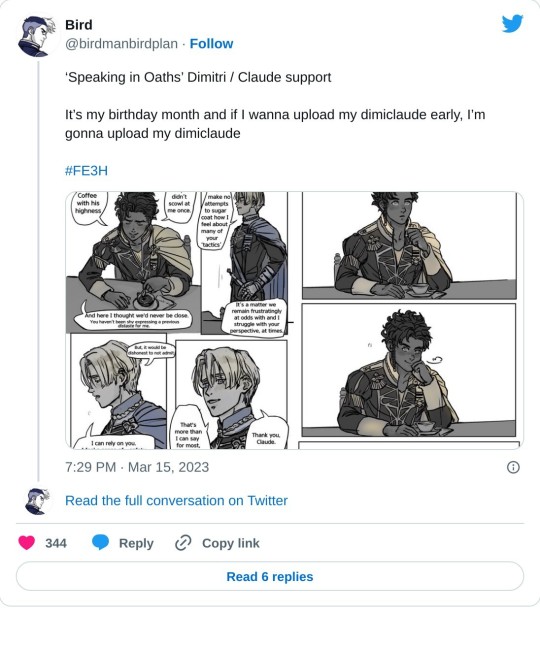
This feels like it was inspired by Engage's Dimitri. But FE3H's Dimitri isn't judgemental, critical, or stuck up with superiority, even when confronted with Claude's scheming. He's not a tsundere. He's more like a deredere or yandere. And he may be proper, but he's not like the nobles who let pride in their propriety, separate them as superior. In FE3H, he taught commoner children. In FEW3Hopes (Yuri Support scenes), he went around helping commoners without telling them he was king. Dimitri is not in the habit of creating emotional divides (that's what made his Boar phase so shocking). He even tried reaching out to Edelgard, during their war, in that FE3H secret meeting.
FE3H Dimitri has always been very open and sweet. He had to be written that way to make his turn after the time skip shocking. And he's always been so desperate for emotional connection and close familiarity, that he was always asking at the Academy, to be treated like any other student. Even in Engage, he was still lamenting how even the people closest to him, like Dedue, still felt emotionally distant.
Without that kind of characterization for Dimitri, too many reasons i ship Dimiclaude fall apart.
Claude's over familiarity (by royal propriety standards) no longer make sense as something that draws in Dimitri.
Dimitri becomes a character i almost dislike, a tsundere.
Dimiclaude's interactions are no longer something so sweet that i'd love the ship. Why would i enjoy watching dimiclaude interact, if Dimitri is going to pretend to be emotionally closed from Claude, even if it's "just at the beginning"? And talk down to Claude too? No thank you, I'm not into that traditional Shojo genre "cool leading man paired with leading lady who just endures his harshness until he decides to finally open up" tropes. I like dimiclaude because in my interpretations, they obviously LIKE each other. Why would Dimitri like Claude if Claude repeatedly annoys him? Why would Claude defy his own internal struggles for true emotiinal closeness, to the degree of lovers, if Dimitri was always scowling at him? Why would i enjoy watching any of that?
But i guess i just have different headcanons from other people. And we're all allowed to have our different headcanons. I'm sure people who love the "tsundere bishounen with enduring partner" dynamic or "enemies to lovers", get something valuable out of it. It's just not for me.
#KhalidMitya#fe3hfuukasetsugetsu#relationship dynamics#headcanons#interpretations#dimamityaAB#character analysis#characterizations#mypovdimitricharacterization
2 notes
·
View notes
Text

I ship it. I'm not sure I understand why Joong-gil is taking so much heat. I haven't read that many fics, but I keep hearing about his need to apologize. Need to apologize for murdering those that were spreading rumors about her? Does he need to apologize for being such a jerk as The Reaper? Is he responsible for her decision to kill herself?
Why after how many ever hundreds of years is she the one who remains aloof. Why does she resent him? Does she blame him for her choice?
On the flip side, is she ashamed of her choice? Is she not ready or not willing Give herself that chance to love again?
Any input would be awesome. This is a true quandary for me.
#koo ryeon#park joong gil#mbc tomorrow#kdramanetwork#kdramadaily#kdrama#marvel mcu#netflix original#characterizations#tomorrow fanfiction#tomorrow kdrama
10 notes
·
View notes
Text
I know, “enough with Snow White, Rapunzel!”
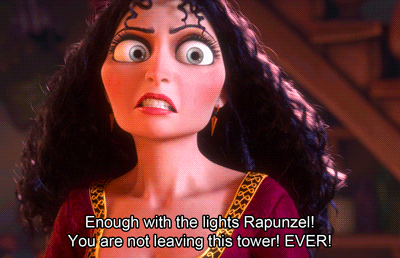
But I was thinking about now part of the “One Song” sequence that I think says so much with so little.
It’s this part right here:

When he’s surprised her by joining in on her song (which is literally about the love she wishes for most, a very vulnerable and revealing song) she understandably runs into the castle. That could be for lots of reasons: I think the one we jump to immediately is “stranger danger.” The Evil Queen could also have forbidden her to talk to anyone; she might also just be shy. Regardless—
This part where she looks down and seems to remember that she’s in rags, and think of her appearance. It’s so interesting.
I maintain that this is the part of the movie where the Prince and Snow White learn the core of who each other are, fall in love, and get engaged all in one song. But this part where she looks at her rags is such a good argument for that.
She’s listening to him start his song, and she literally looks down st what she’s wearing right at the moment when he says, in the song, for the first time, “only for you.”
It doesn’t matter if she’s thinking, “Oh, I’m about to go back out where he can see me, how do I look?” or “he loves me even though I’m dressed like this?” Doesn’t matter which. The animators hand-drew this moment of her looking at what she’s wearing, not when she first realizes he’s there, but after that—when he declares his love for her.
He’s expressing that she’s won his heart, and she’s realizing that she’s in rags. He’s choosing her even though she’s dressed like a scullery made. He doesn’t know she’s a princess, you also have to remember that. So obviously she’s still the Fairest of All in spite of what she wears, but her clothes also signify her place in society, and that’s still not stopping him.
No wonder she follows this up by going out onto the balcony, favoring him with a smile, and sending him reciprocation by way of a kiss on a dove. No wonder she instantly accepts him—not just because she’s a love-starved child who’s longing for her dream to come true, but because of who he is demonstrating himself to be.
He’s a guy who heard her deepest wish and was bold and secure enough to come offer to fulfill it—even though she’s a scullery maid dressed in rags. Even though he has no assurance of being accepted. Even though she ran away. He’s not afraid to tell her that he has one love that has possessed him, thrilling him through, and wants to be constant and true and give it to her.
If a guy were confident and secure in who he is enough to hear your fondest desires, and treat them gently, and offer to give them to you no matter what, even though there appears to be a huge class disparity between you and you didn’t exactly respond in a gracious manner off the bat, wouldn’t you feel like you’d found a treasure of a human? No wonder.
No wonder she’s able to have faith in his promise and sing “Someday my Prince Will Come.” What a prince he is!
#Justice for the Prince#Snow White and the Seven Dwarfs#Snow White#Snow White and the Seven Dwarfs 1937#Snow White 1937#character analysis#movie analysis#mother gothel#enough with the lights rapunzel#rapunzel#tangled#Snow White 2024#Rachel Zegler#Walt Disney#Disney#analysis#film meta#characterizations#animation#animation history#Snow x charming#Snow White Prince Charming
152 notes
·
View notes
Text
"Les Misérables" musical character interpretations: Javert
Next in my series of characterization comparisons: Javert.
These descriptions are all based on performances of the role that I've seen, either in person or filmed. They can also be combined with each other to create more characterizations: for example, I think Earl Carpenter's excellent Javert struck a balance between the Heart of Stone and the Firebrand, with hints of the Neurotic here and there. I've only seen one Dutiful Officer, though – we all know who – and I'm not sure if that portrayal would work onstage or if it requires the subtlety of film acting.
By the way, I've only attributed a sarcastic sense of humor to the Neurotic because that's what I've seen. In theory, any type of Javert could have that quality, but in my experience, the most sarcastic Javerts have also been the most neurotic and mentally unstable by the end. Whether this is a general rule or not I don't know.
The Heart of Stone

This Javert embodies the hard, cold, unbending nature of the law. He stands with perfect, rigid posture and makes no unnecessary movement. His face is generally emotionless too, except to convey an icy disdain. His entire body and voice radiate sternness, discipline, dignity, and iron-clad dedication to his duty. Rarely will he use physical intimidation or threats of violence – his baton is usually tucked firmly at his side, only raised when necessary – but his hard, withering stare and cutting tone of voice are enough to make anyone except Jean Valjean submit to his will. Lawbreakers barely register as human beings to him: they’re simply dirt to be swept off the street. Only Valjean comes to matter personally for his elusiveness. Yet even then, we sense that he would hunt any other convict just as relentlessly, and that he despises Valjean less as a person than as a symbol of crime, just as he himself seems almost more like a symbol of pitiless law than a human being. This isn’t to say that he’s too stoic and detached to be fierce: in moments like “Confrontation,” he has no lack of ferocity. But it’s a hard fierceness, like the sharpness of an icicle. Even in anger, he never loses control of himself, but is deliberate, decisive, and stony. That is, until Valjean shatters his worldview by sparing his life. At this point, we realize that this Javert is all too human after all, as despite his efforts to fight it, he spirals into confusion, helpless rage, and despair. It’s particularly shocking and poignant to see this Javert fall apart, because he was such a block of granite, who once seemed as if he would never crumble.
The Firebrand

This Javert’s defining trait is anger. He often – though not always – tends to be younger than the Heart of Stone, with the fiery energy of youth and with the wounds of his childhood as the son of criminals still raw. In the Prologue, his “No!” in response to Valjean’s “Yes, it means I’m free!” will likely be an indignant shout (rather than, say, a quiet, disdainful sneer), and if Valjean is especially insolent, he might give him hard blow with his baton. Or else he might not: he might have a controlled, rigid veneer that superficially resembles the Heart of Stone. But whether his fire is contained or wild, we constantly see it burning. He shows utter contempt for every lawbreaker and disgust when they try to beg for mercy, and he typically handles them all in a more aggressive, physical manner than other Javerts do, with free use of his baton for intimidation. His hunting of Valjean is clearly not just dedication to the law, but a quest for revenge against the man he considers his greatest challenge. Their mutual hostility is fiercely personal. His barricade scenes are fierce too, with the students likely needing to restrain him from attacking Enjolras or Gavroche after he’s exposed as a spy. The first stanzas of “Javert’s Suicide” will naturally blaze with fury too. But for the first time in his life, his anger proves futile. Then at last, it dissolves, and more vulnerable emotions consume him: childlike fear, desperation, maybe even tears. To describe just how Valjean’s mercy breaks him, we might recall this quote from Man of La Mancha: “Blows and abuse I can take and give back again. Tenderness I cannot bear.”
The Neurotic
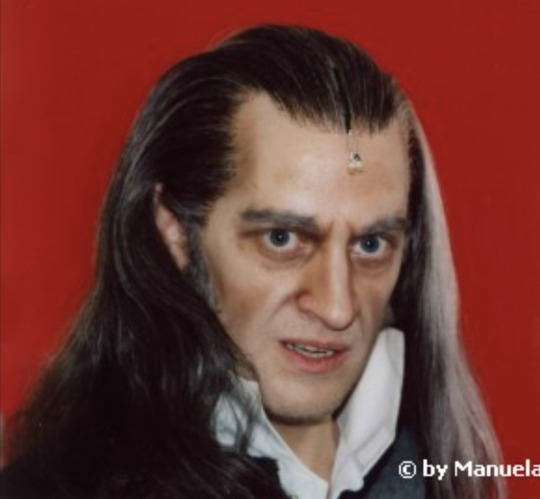
This Javert’s whole journey is a slow descent into madness. At first, he seems like a Heart of Stone: cold, stern, efficient. In his flinty calm, he might even display a sarcastic sense of humor at times. But during “The Runaway Cart,” the cracks start to appear. He’ll convey a quiet yet chilling sense of anger that Jean Valjean has eluded him for so long, and of subtly sadistic pleasure that he’s finally been caught. Then when Monsieur Madeleine, the mayor whom he’s deferred to and obeyed, reveals himself as the real Valjean, something snaps within him. In “Confrontation,” this Javert will be frenzied, animalistic, nearly crazed in his joy at having Valjean in his clutches and then rage when he resists arrest; when they fight at the end, he’ll likely try to brutally beat Valjean, not caring if he takes him away alive or dead. When we meet him again in Paris, nine more years of vain searching will have done no favors for his mental health. This Javert’s rendition of “Stars” isn’t a firm statement of belief, but an anxious, desperate attempt to assure himself that the law is “the way of the Lord” and will prevail. He looks to the stars for comfort; their stability soothes his increasingly unstable mind. In the barricade scenes, he shows increasingly ferocious rage, by now much more like a Firebrand Javert than the calm, sarcastic Heart of Stone he once seemed to be. And when the object of his obsessive hatred spares his life, a total breakdown occurs. His suicide soliloquy is a display of wild-eyed, body-contorting, shuddering insanity, both frightening and pitiful. Yet this breakdown is no shock to us; we will have seen it coming long ago.
The Dutiful Officer

When Valjean sings “You’ve done your duty, nothing more” to this Javert, the audience will be more inclined than usual to agree with him. This inspector is neither icy, nor fiery, nor neurotic, but an ordinary policeman we might meet every day, simply dedicated to his job. While of course he’s stern, unbending in matters of the law, and willing to use intimidation or violence when necessary, he’s a reserved man who rarely gets angry and whose usual demeanor is of dutiful stoicism, not fierceness, sarcasm, or rigidity. Though he disdains lawbreakers, he hasn’t fully lost sight of their humanity and is sometimes willing to hear them out, though their words never move him to mercy. Nor does Jean Valjean seem to be a particular object of his obsession: like his more imposing cousin the Heart of Stone Javert, he would hunt any other convict just as doggedly. The deaths of the revolutionaries don’t leave him unmoved either. Rather than just searching for Valjean after the barricade falls, he’ll survey the students’ bodies with quiet, grim horror, and be especially shaken when he finds Gavroche’s body. At this point, we’ll sense that Valjean’s earlier mercy has opened his eyes to all the law’s injustice, and that as a result, the slaughter at the barricades becomes essential to shattering his faith. Also unique to this Javert is his air of quiet thoughtfulness. There’s no epic breakdown in “Javert’s Suicide”: it’s an anguished yet reflective, intimate moment, where he quietly mulls over his torments and ultimately finds no logical choice but to die. He’s a less dramatic Javert than others, but of all Javerts, he’s the one who most clearly isn’t a villain.
More comparisons to come!
#les mis#les miserables#musical#javert#characterizations#comparison#tw: violence#tw: death#tw: suicide
66 notes
·
View notes
Text
I love the "came back wrong" trope but from the opposite side.
Imagine you are dead. And then you are RIPPED from the embrace of decay into the world of the living again. Your memories are hazy and you don't recognize any of these people, but they act like they're close to you? Like they love you? So you try to get your memories back, to act like you belong here, but everybody tries to forget you died. And you can't. It is omnipresent. And just trying to grapple with that fact pushes the people who "love" you away, and they're incapable of understanding, and they're so confused, what's wrong N̶̄̀O̶͛͗T̷̉́ ̷͋͝Y̴̎̌Ȍ̴̈U̸̓R NÄM̴̃͑E̵̾̇? And you just need them to understand, you aren't that person! You aren't! You don't know who that person is! You don't know why any of this is happening, but they're unwilling to bend, they keep insisting you are that person, your memories will come back, everything will be normal again, and you want to scream and cry and claw yourself open to show them you're different. Your existence as a being wholly separate from whoever you "used to be" is a sin unto itself. All you can do is scrabble for life and to them, you're killing whoever they loved to do it.
just. lots of fun in that concept, you know?
#writing#media#tropes#characterization#character dynamics#came back wrong#kiriona gaia#nona#alecto#tlt#the locked tomb#personal growth#trans#transgender#like the whole trope is very transgender#vulture chatter
61K notes
·
View notes
Text
i really think we should all outgrow once and for all the idea that a character making a dumb decision is a plot hole. sometimes people are dumb. sometimes a character making a smart and informed decision is the real plot hole
#number one thing that should remain consistent is characterization#always wonder 'what would this dumbass do'
30K notes
·
View notes
Photo

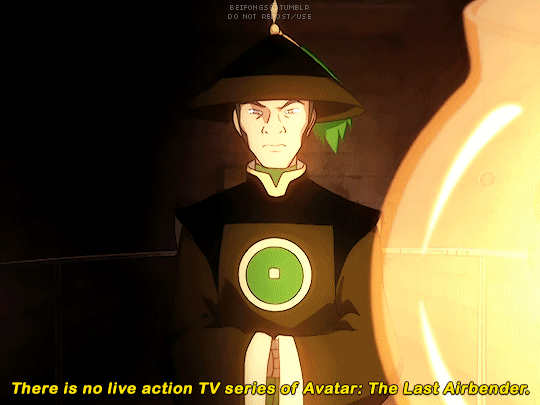
There is no live action adaptations of Avatar: The Last Airbender...
#atla#Avatar the Last Airbender#atlaedit#animationedit#*mine#flashing tw#this is my coping mechanism#praying season 2 of the live action series doesn't get greenlit on Netflix#because if they ruin Toph's characterization i will literally start throwing rocks at people
10K notes
·
View notes